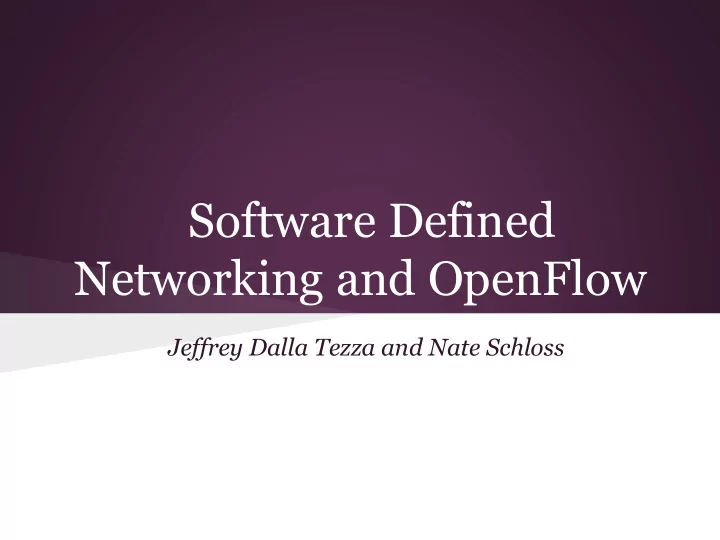

Software Defined Networking and OpenFlow Jeffrey Dalla Tezza and Nate Schloss
Agenda • What is SDN • SDN Today • What is OpenFlow • Why OpenFlow • What’s next for SDN • Our OpenFlow Demonstration
Software Defined Networking • Wikipedia defines it with three characteristics: o An approach to building computer networks that separates and abstracts elements of these systems . o Allows system administrators to quickly provision network connections on the fly instead of manually configuring policies. o Allows network administrators to have programmable central control of network traffic .
Software Defined Networking • Those are the goals for SDN, but it is really just programmable control of networking devices • Current models o JunOS by Juniper o IOS by Cisco o Application Fluent Network by Alcatel-Lucent o OpenFlow • All of those give some degree of programmatic control, but they all have trade offs
Current SDN Technologies • IOS by Cisco and JunOS by Juniper Separates and abstracts elements of networking systems Allows system administrators to quickly provision network connections on the fly Allows network administrators to have programmable central control of network traffic.
Current SDN Technologies • Other companies also have proprietary solutions Application Fluent Network by Alcatel-Lucent o Linerate systems o • Since these all require specific hardware large scale adoption is unlikely
Current SDN Technologies • OpenFlow by the Open Networking Alliance Separates and abstracts ? elements of networking systems Allows system administrators to quickly ? provision network connections on the fly Allows network administrators to have ? programmable central control of network traffic.
What is OpenFlow • OpenFlow is an open specification by the Open Networking Foundation for connecting to and controlling routers and switches • Basic Capabilities: o Define and query the routing table o Intercept and modify packets o Query routers and switches for statistics about the network
OpenFlow • The basic architecture
Flow Table • Each switch maintains a Flow Table 3 • Flow tables contain entries (flows) of the form: <Header Fields | Counters | Actions> o Packets are matched against header fields o Counters are then updated based on the matching packet o Actions are then applied to packets
Matching • Matching Fields o Ingress Port o Ethernet source/destination address o Ethernet type o VLAN id/priority o IP source/destination address o IP protocol/ToS o Transport source/destination port • Fields can be partially matched (e.g. IP subnets) or wild carded
Counters • If a packet matches a flow entry it can update the relevant counters. • Counters can be maintained: o Per table o Per flow o Per queue • Counters can track: o Received packets Transmitted Packets o Transmit/Receive errors o o Received bytes Etc.. o o Duration
Actions • After matching a packet the switch can apply the following actions: o Forward out of a port(s) o Encapsulate and send to controller o Drop packets o Modify packet headers
Controller • The controller is connected to the switch, through the OpenFlow communication protocol it can query and modify counters and the flow table • It can also receive packets from the data plane • The controller can be any arbitrary program that uses the OpenFlow protocol o Maestro o NOX/POX o Ryu o Beacon o and others o Floodlight
OpenFlow • Does OpenFlow by itself give us SDN? Separates and abstracts ? • But why elements of networking systems would it? • You don’t Allows system expect x86 to administrators to quickly ? provision network have merge connections on the fly sort right out of the box Allows network administrators to have ? programmable central control of network traffic.
So, what's the point? o OpenFlow gives unified specifications o Any hardware vendor can support it o Any 3 rd party software vendor can write software for it o IOS, JunOS and Application Fluent Network provide hardware specific solutions o As OpenFlow adoption increases the incentive for vendors to support OpenFlow increases
People using OpenFlow • OpenFlow is currently used in all of Google's data centers 1 • Almost all the big names are members of the Open Networking Foundation 2 o Google o Facebook o Verizon o Cisco o Samsung o Broadcom o etc...
How do we Realize SDN Using OpenFlow? • OpenFlow provides network control, but at a low level • We still need proper abstractions and centralized control
Centralized Control • Real systems are globally distributed • Large systems have to account for failure • We need one logical controller with a global view of the network • This requires coordination between physical servers distributed geographically
Proper Abstractions • Once we have a distributed controller we need the ability to install the configuration on the network • Control policies should be specified at a high level, they should not be dependent on the state of the network
Proper Abstractions Source: Scott Shenker
Demonstration • Load balancing using OpenFlow • Clients are directed to different webservers by the controller • A program connected to the controller can specify access control for specific IPs
Demonstration Controller Physical Network Layout Switch 2 Switch 1 VM Host WiFi Clients
Demonstration Abstract Network Layout Controller Switch … … Server 1 Server 5 WiFi Client 1 WiFi Client n
Demonstration • Get out your laptop/phone and connect to the open network named ‘ OpenFlow ’ • In your web browser go to http://192.168.0.1/ • To be reassigned to a new server, wait 15 seconds and refresh
Bibliography • 1: http://searchsdn.techtarget.com/news/2240 181909/Vint-Cerf-At-Google-OpenFlow-now- runs-in-all-data-center-networks • 2: https://www.opennetworking.org/membersh ip/member-listing • 3: http://www.openflow.org
Recommend
More recommend